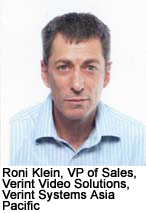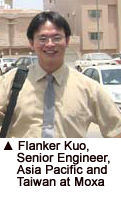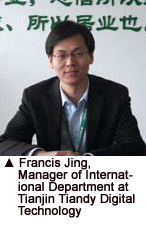At GDSF China, ASMAG.com had the opportunity to talk to three top executives from Nice Systems on new security concepts, and their perspectives on the global recession and Asian markets.
At GDSF China, ASMAG.com had the opportunity to talk to three top executives from Nice Systems on new security concepts, and their perspectives on the global recession and Asian markets.
After 20 years in electronic security, Nice management decided to branch out to provide applications and solutions. In order to serve various security requirements — whether at government or private organizations — Nice is offering a completely new methodology to deliver greater efficiency and cost savings.
Eytan Gilboa, Vice President of Security Sales at Nice Systems (APAC), stressed the importance of performing security assessments prior to investment. "We are bringing a completely new message to the industry," said Gilboa. "I believe that the attendees deserve something new instead of having a company talk only about its products. Our advice is to take a step back and think about the threats and what kind of security is needed. We believe that if people approach security this way, they will benefit more, and it does not cost a huge investment."
Airports, he said, should first consider the possibility of external attacks such as those from shoulder-launched bazookas, which have a shooting range of 400 meters. "Unfortunately, perimeter installations are rarely this extensive," said Gilboa.
In addition, he observed that frequent construction around airports yields hard-to- detect places. He suggested adjusting landing paths to avoid such risks. "Doing so does not cost a penny as there is no need to install advanced perimeter security or cameras."
detect places. He suggested adjusting landing paths to avoid such risks. "Doing so does not cost a penny as there is no need to install advanced perimeter security or cameras."
Turning Data into Intelligence
Turning data into useful information is another key factor. Sandy Gilchrist, Director of Public Safety and Security at Nice Systems, pointed out that data is only data if you just record something and do not manage it. "Only when people get access to the data does it become information," he said.
"It remains, however, unstructured information unless you add content or other in-depth analytics to it." At this stage, he continued, unstructured data is turned into structured data, allowing users to read and use it.
"The majority of people in the technology field store data and look at data from a niche perspective," said Gilchrist. "What we do is turn that data into intelligence, allowing decisions to be made cleverly."
Different information, however, means different things to different parts of the business. "What we do is provide different levels of access to different levels of information to create a much more coherent enterprise whether the business is engaged in security or media," stressed Gilchrist.
The Nice Way
As a software-based company, NICE has less need to invest in manufacturing; rather, it creates projects with an integrated system and local support. Doron Ben-Sira, President, Nice Systems (APAC), pointed out that the industry has been moving from the hardware-centered approach to the software centered approach.
More than 60 percent of the entire Nice workforce is in service, implementation and technical support. (More than 150 people in Asia alone). "We have vast resources in place to support all major projects," said Ben-Sira. "We are also investing heavily in the processes of getting the necessary certification."
Nice works with partners to provide proper training and certification. "We do not do actual installations," said Ben-Sira. "Installations are done by system integrators. We provide them with complete support on each project. This is very important in terms of what we are offering today — advanced technology and solutions with local presence."
Ben-Sira explained that the company's values are service, support and long-term relationships. "Sometimes, it takes longer to deal with the customers for the first time. They have to get to know us, including our products, services, solutions and presence in the country. Nice is very serious about investing the resources to enable close work with our customers, be they government agencies or major enterprises."
"Generally speaking, the second time around or working on an expansion project  is faster because the trust is established," said Ben-Sira. "Up to 70 percent of our customers work with us again. That is a very high percentage. That stems from our focus on long-term relationships."
is faster because the trust is established," said Ben-Sira. "Up to 70 percent of our customers work with us again. That is a very high percentage. That stems from our focus on long-term relationships."
Optimistic on Security
The world economy outlook is gloomy due to soaring oil and commodities prices. Meanwhile, the U.S. market has been seriously affected by a subprime mortgage crisis. Ben-Sira, however, remains optimistic. "At this point, we do not see any slowdown or recession in the Asia-Pacific region," he said . "Of course, we cannot ignore these negative trends. We are monitoring them very carefully."
According to Ben-Sira, demand for NICE solutions is rising. "Some of our solutions, which focus on improving efficiency, enable companies to save money during the economic downtime. Big organizations are actually equipping themselves with more advanced technologies to deal with all kinds of scenarios. This is not a purely security question. We have, for example, solutions for fraud, money laundering and financial analysis."
Recessions, added Ben-Sira, actually benefit the Asia-Pacific region as they often lead to more outsourcing opportunities.
Asian Markets
Many predicted that demand for electronic security products in China would decrease after the Beijing Olympics. Gilboa, however, sees things differently, pointing to several big events after 2008, such as the Shanghai Expo and Guangzhou Asian Games in 2010. Moreover, the Chinese government is planning to build 42 high-speed railways nationwide in five years as well as developing the metro system through all major cities in China. "The infrastructure investment is still going on. Demand for our solutions in the Chinese market goes far beyond the Beijing Olympics."
In Asia, developing countries are increasingly open to high-level solutions. "The gross domestic product (GDP) in emerging markets today," said Ben-Sira, "is much higher than 10 or 15 years ago. Willingness to accept new technologies is happening at a much faster pace. Take a look at IP, VoIP and content analysis."
In China, India, Malaysia and Indonesia, he sees "very fast" adoption of new solutions. In Asia, Ben-Sira does not see emerging markets. "Today, they are all advanced."
Nice has several major projects in Southeast Asia, including new airports in  Thailand and Singapore. Terminal Three at Changyi Airport in Singapore, said Gilboa, is the first in the region with Nice's major content analytics solution. "We see Southeast Asia as an important region," said Gilboa. "We have been increasing our resources and investment in the region since 2004. We have been working very closely with the governments there as well as large multinationals."
Thailand and Singapore. Terminal Three at Changyi Airport in Singapore, said Gilboa, is the first in the region with Nice's major content analytics solution. "We see Southeast Asia as an important region," said Gilboa. "We have been increasing our resources and investment in the region since 2004. We have been working very closely with the governments there as well as large multinationals."
Japan is also an important market. "We have been active in Japan for 12 years," said Ben-Sira. "We are lucky to have several trustworthy partners." The network of partners and cooperation with leading customers have enabled NICE to gain share in what for many considered a difficult market.
Finally, in India, numerous governmental, financial and telecom projects are keeping its 70-person office busy supporting the booming market. "Today, China, Japan and India are our top three markets in Asia," said Ben-Sira. "We are, however, also actively monitoring Korea, Singapore and Australia."